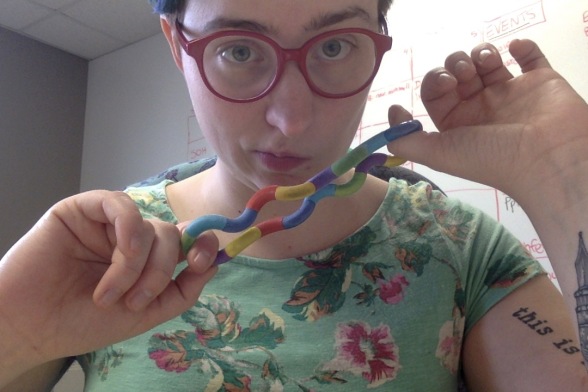It’s almost April, which means it’s almost Autism Awareness Month, which means it’s almost the time of year where Autism Speaks becomes even more insufferable and awful than they are the rest of the year and a lot of advocates try to combat the Speaks messaging with messaging of their own. I’m all for reminding people that Speaks is not the only or even one of the better autism organizations, and for giving people concrete facts about what Speaks has done to harm people with autism.
But one thing that has been grating on me is that I see the message “we need acceptance not awareness” all over the place during April. I get it. We do need acceptance. There are lots of organizations that use the guise of “awareness” to peddle really harmful BS. Autistic people really do need the same respect, autonomy, and fulfillment as anyone else, and nothing else will improve their lives as quickly. These are great goals and I fully support them. But a lot of Autistics and their families say that people are already aware of autism, so we don’t need awareness anymore.
I strongly disagree.
Personally I’m a big fan of the word “and”. We need acceptance AND we need awareness.
When I came out to my parents as autistic, they almost laughed at me in disbelief because they had a very different picture in their mind of what autism was (think more Rain Man, less me), and were not aware of how it can present differently in women. I still hear stories of people getting misdiagnosed because their therapist didn’t think women could have autism.
When I talk to friends, they still use “autistic” to mean socially awkward or obsessive, but they have never heard of many of the other traits of autism, nor do they understand the whole “spectrum” concept.
When I explain that people on the spectrum can have sensory sensitivities, I often am met with confusion or surprise. I’m still seen as picky or high strung because I cannot eat certain foods without a gag reflex. People are confused when you call perfumes and scents an access issue.
Sure, people know that autism exists, and might have a vague understanding of what it is, but many, many people don’t understand how it actually affects people. I tend to run in circles that are pretty up on psychological information, and even my circles are full of people who require a lot of 101 explanations of how their behaviors can make my life hard or how to do basic accessibility or even what autism can look like.
Awareness is not simply awareness that autism exists: it’s awareness of what autism is and why autistics behave in the ways they do and what the current issues are in the autism community. Of course we can’t educate every person on every nuance of autism, but that doesn’t mean we can’t give most people a solid foundation of understanding that will help them be more accepting.
Because I have a secret about human behavior for you: people will not accept your behavior unless they understand it. Acceptance relies on awareness. People are way more likely to accept your differences if they have some understanding of why you do what you do and have at least some ability to predict your behavior (does this sound familiar autism community? Do we sometimes find it hard to accept things that we don’t understand or that are sprung on us without prep time? Can we start implementing universal access in our own lives by walking allistic people step by step through what to expect?)
Now sure, it would be way better if we could all just accept each other’s differences without question, but that’s not how humans work. Some people can make that happen with a lot of work (in DBT we call it the skill Radical Acceptance), but acceptance is much easier with an explanation. We don’t just need to be aware of the existence of autism, but of the reasons it might push someone to behave in what we view as incomprehensible ways. We need to make autism comprehensible to others.
So no, I’m not done educating or increasing awareness. I want people to be aware of sensory sensitivities and what it means to be nonverbal, I want people to be aware of meltdowns from the internal perspective, I want people to be aware of what a fidget is and why someone might use it, I want someone to be aware of how their language and communication style might be alienating someone. And THEN I want them to accept all these differences. But I don’t think we’re done with step one yet. So I will still advocate for increased awareness, because I have experienced the ignorance of many folks when it comes to autism.
As a final note, none of this means that we have to do awareness before we can do acceptance. I think we should be working on both all the time. I am all for criticizing awareness done poorly. If you’re spreading misinformation (Jenny McCarthy…Autism Speaks…looking at you), then I’d rather you shut your mouth than try to help. But criticizing the whole idea of awareness? That doesn’t make sense. I want people to understand my life. I am always for more education.




